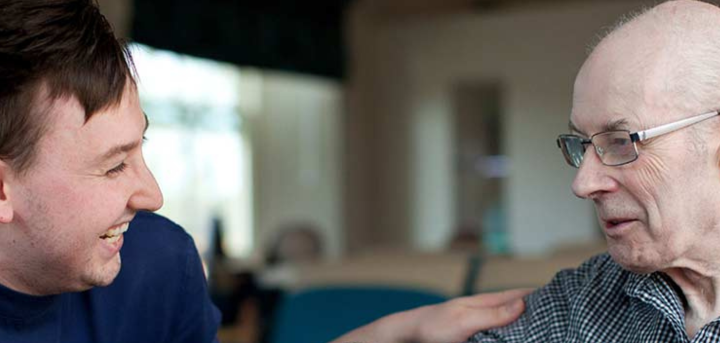Know What To Do
Published on 07 August 2023 01:45 PM
New research from Age UK reveals that 6.6 million people worry they wouldn’t know how to support their older parents.
Age UK has released new statistics that highlight just how tough supporting an older parent can be, as part of its Know What To Do campaign to help raise awareness of the huge challenges facing many older people and those around them.
With people living for longer, greater pressure on the health and social care system and the continued cost of living crisis, the responsibility of supporting ageing parents is increasingly falling on adult children. The new research suggests that one of the biggest concerns people have about supporting an older relative is their lack of knowledge around what to do to help their parents as they age. 6.6 million people aged 40-60 (79%) who are considering caring for or supporting an older parent in the future, worry that they wouldn’t know how to support themi.
This fear is coupled with the challenges of managing their own responsibilities with the needs of ageing loved ones. Around 5.7 million (69%) who are considering caring for or supporting an older parent in the future, say they would find it hard to care for or support their parent(s) whilst juggling their own life, such as their job and childrenii.

Money worries also top the list of things to be concerned about in the future, with 5.1 million/three fifths (61%) of adults aged 40-60 considering caring for or supporting an older parent saying they would struggle to manage financiallyiii.
Additionally, three quarters/6.1 million (74%) of adults aged 40-60 thinking about caring for or supporting an older parent in the future say they would find it stressfuliv.
Following the launch of the Charity’s latest TV film that first aired in March/April, Age UK is getting ready to launch an updated version of the film for summer which shines a light on the anxieties those with older parents have as they anticipate taking on the responsibility of supporting their loved ones. Age UK’s Know what to do film and campaign point out that no one needs to cope with these issues alone and that Age UK is there to help.
Age UK’s national services are a lifeline, especially for older people who have no one else to turn to. The Charity’s free and confidential Advice Line is staffed by friendly people and backed up by subject experts on issues like pensions and social care, equipping it to provide support about a wide range of topics that tend to impact in later life.
Information & Advice
Age UK Plymouth can provide you with free, independent and confidential information and advice on a range of issues relating to those age 50+. This includes information on rights and entitlements, local services and support available, information on staying safe and warm at home and housing options.
Further highlighting the fact that so many just don’t know what to do when it comes to supporting older parents, the research found that large numbers of adult children are unaware of available resources, support systems or procedures to support their parent as they deal with getting older. 4.1 million adults aged 40-60 (49%) considering caring for or supporting an older parent in the future say they wouldn’t know how to help their parent(s) get carev.
2.2 million adults aged 40-60 (27%) considering caring for or supporting an older parent in the future say they wouldn’t know what to do if their parent(s) have a fall viand over a third (35%) say they wouldn’t know what to do if their parent(s) become isolated or lonely.
Age UK’s research also highlights the experiences and challenges for those who already care for an older parent. 3.3 million adults aged 40-60 already currently care for or support at least one older parent with tasks including:
• taking them shopping or doing their shopping for them (72%)
• helping with household chores (68%)
• accompanying them to medical appointments (67%)
• looking after them if they are unwell (63%)
However, of the adults aged 40-60 who are already caring for a parent, three fifths/2.0million (60%) said they didn't know how hard caring for or supporting their parents was going to bevii.
.

Despite the challenges and worries linked to caring for and supporting older parents, many of those questioned recognised the importance of this stage in their relationship. Three fifths/1.9 million (59%) of adults aged 40-60 currently caring for or supporting an older parent think supporting their parent(s) has brought them closerviii and nearly three quarters/2.4 million (72%) enjoy being able to give something back to their parent(s)ix.
Julie is in her 50s and cares for her mum who is in her 80s. Her mum lives around 50 miles away and has dementia. Julie tries to visit her regularly to do her housework, make sure she gets out of the house, and take her to various health appointments. Julie also calls her twice a day to make sure she's ok, however she finds it challenging to balance her full time job and looking after her mum. Julie's mum uses Age UK's Telephone Friendship Service and speaks to her telephone friend once a week.
Julie said:
"You're not taught how to look after a parent as they get older, it's something you feel you just need to learn on your own. It's really hard to have a full time job whilst also looking after my mum, I'm worrying about my own life and work, whilst also worrying about my mum.
I call my mum twice a day and if I'm not able to call her because of something going on at work then I know she worries and that can be upsetting, especially as my mum's dementia means she needs a regular pattern. You don't think you'd ever end up having your parent depend on you, and it's tough but it has to be done because it's your mum."
Caroline Abrahams, Charity Director at Age UK
"Inevitably, as our parents get older, at some point they are likely to require more help. This can be really difficult for them if they are accustomed to being highly self-sufficient, and reluctant to acknowledge that they can't do everything they used to, unaided. Perhaps less obviously, this often poses challenges for adult children too, as we have to come to terms with what the passage of time means for our Mums and Dads, as well as working out what's best to do from a practical point of view, including navigating the complex health and care system. I should know, I've been there myself in recent years with my own mother, who died some eighteen months ago. Helping to care for her was an extraordinary experience, one I am very pleased I had, but it was by no means all plain sailing and I had a lot more support to draw on than most."
i
The weighted percentage of respondents who are considering caring for or supporting an older parent in the future saying that they worried they wouldn't know how to support them (78%) was multiplied by the weighted percentage of people in the sample who said that they were considering caring for or supporting an older parent in the future (45%), and this was multiplied by the
Office for National Statistics mid-year estimate for 2021 of the number of people aged 40-60 in the UK (18.5 million) to give an estimated number of 6.6 million people aged 40-60 who are considering caring for or supporting an older parent in the future who would say that they worried they wouldn't know how to support them.
ii
The weighted percentage of respondents who are considering caring for or supporting an older parent in the future saying that they would find it hard to care for or support their parent(s) whilst juggling their own life, such as their job and children (69%) was multiplied by the weighted percentage of people in the sample who said that they were considering caring for or supporting an older parent in the future (45%), and this was multiplied by the Office for National Statistics mid-year estimate for 2021 of the number of people aged 40-60 in the UK (18.5 million) to give an estimated number of 5.7 million people aged 40-60 who are considering caring for or supporting an older parent in the future who would say that they would find it hard to care for or support their parent(s) whilst juggling their own life, such as their job and children.
iii
The weighted percentage of respondents who are considering caring for or supporting an older parent in the future saying that they would struggle to manage financially whilst supporting their parent(s) (61%) was multiplied by the weighted percentage of people in the sample who said that they were considering caring for or supporting an older parent in the future (45%), and this was multiplied by the Office for National Statistics mid-year estimate for 2021 of the number of people aged 40-60 in the UK (18.5 million) to give an estimated number of 5.1 million people aged 40-60 who are considering caring for or supporting an older parent in the future who would say that they would struggle to manage financially whilst supporting their parent(s).
iv
The weighted percentage of respondents who are considering caring for or supporting an older parent in the future saying that they would struggle to manage financially whilst supporting their parent(s) (61%) was multiplied by the weighted percentage of people in the sample who said that they were considering caring for or supporting an older parent in the future (45%), and this was multiplied by the Office for National Statistics mid-year estimate for 2021 of the number of people aged 40-60 in the UK (18.5 million) to give an estimated number of 5.1 million people aged 40-60 who are considering caring for or supporting an older parent in the future who would say that they would struggle to manage financially whilst supporting their parent(s).
v
The weighted percentage of respondents who are considering caring for or supporting an older parent in the future saying that they wouldn't know how to help their parent(s) get care (49%) was multiplied by the weighted percentage of people in the sample who said that they were considering caring for or supporting an older parent in the future (45%), and this was multiplied by the Office for National Statistics mid-year estimate for 2021 of the number of people aged 40-60 in the UK (18.5 million) to give an estimated number of 4.1 million people aged 40-60 who are considering caring for or supporting an older parent in the future who would say that they wouldn't know how to help their parent(s) get care.
vi
The weighted percentage of respondents who are considering caring for or supporting an older parent in the future saying that they wouldn't know what to do if their parent(s) had a fall (27%) was multiplied by the weighted percentage of people in the sample who said that they were considering caring for or supporting an older parent in the future (45%), and this was multiplied by the Office for National Statistics mid-year estimate for 2021 of the number of people aged 40-60 in the UK (18.5 million) to give an estimated number of 2.2 million people aged 40-60 who are considering caring for or supporting an older parent in the future who would say that they wouldn't know what to do if their parent(s) had a fall.
vii
The weighted percentage of respondents who currently care for or support an older parent saying that they didn't know how hard it would be (60%) was multiplied by the weighted percentage of people in the sample who said that they were considering caring for or supporting an older parent in the future (18%), and this was multiplied by the Office for National Statistics mid-year
estimate for 2021 of the number of people aged 40-60 in the UK (18.5 million) to give an estimated number of 2.0 million people aged 40-60 who currently care for or support an older parent who would say that they didn't know how hard it would be.
viii
The weighted percentage of respondents who currently care for or support an older parent saying that they think it has brought them closer (59%) was multiplied by the weighted percentage of people in the sample who said that they were considering caring for or supporting an older parent in the future (18%), and this was multiplied by the Office for National Statistics mid-year estimate for 2021 of the number of people aged 40-60 in the UK (18.5 million) to give an estimated number of 1.9 million people aged 40-60 who currently care for or support an older parent who would say that it has brought them closer.
ix
The weighted percentage of respondents who currently care for or support an older parent saying that they enjoy being able to give something back (72%) was multiplied by the weighted percentage of people in the sample who said that they were considering caring for or supporting an older parent in the future (18%), and this was multiplied by the Office for National Statistics mid-year estimate for 2021 of the number of people aged 40-60 in the UK (18.5 million) to give an estimated number of 2.4 million people aged 40-60 who currently care for or support an older parent who would say that they enjoy giving
something back.
